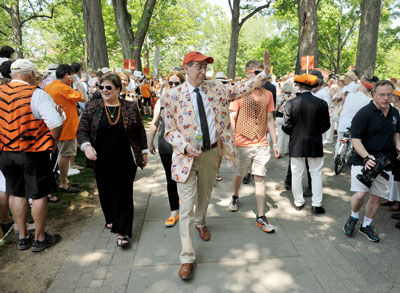By Philip Sean Curran, Staff Writer
Princeton University President Christopher L. Eisgruber on Saturday raised the possibility of relocating the ice hockey arena on campus to make room for a new residential college to house an influx of undergraduates that the university is planning to admit during the next decade.
Mr. Eisgruber, addressing fellow alumni in Richardson Auditorium at Princeton’s annual Reunions weekend, said the university had not picked the site for that college. While the university does not yet know where it will go, he pointed to spaces around the area of Baker Rink.
“There are ways you could tuck a residential college around existing buildings there. There’s also the possibility, over time, that we would move Baker Rink from where it’s currently located,” he said.
Mr. Eisgruber said the arena, though beautiful and one he where enjoys watching hockey in, is not a “first-rate hockey facility or a first-rate rink right now.”
“And so that would be one possibility that might be consistent with what we’re doing in our athletics program,” he said. Baker Rink, constructed in the early 1920s, has been updated through the years but is now the second oldest college hockey arena in the country.
Other possibilities he raised included “doing something” on the other side of Washington Road or to take existing dorms, turn them into a residential college and build upper classmen housing elsewhere.
“So we have flexibility,” he said.
As he has stated before, Mr. Eisgruber said the university does not have to build on the Springdale Golf Course or go across Lake Carnegie.
Expanding the undergraduate student body by 500 more students from the current roughly 5,200 was one of the topics that Mr. Eisgruber covered in his remarks.
He said Princeton rejects a higher percentage of “qualified applicants” than at any time in its 270-year-history. In March, the school announced it had offered admission to 1,894 students out of the 29,303 applicants vying to be part of the current freshman class, for a record low admission rate of 6.46 percent.
“I love all of the students we have on our campus,” he said, “but if we can say yes to some more of those students, I think we will be doing a good thing for them and I think we’ll be doing a good thing for the world by bringing them here to Princeton and giving them the benefit of that education that all of us have.”
Mr. Eisgruber touched on the accomplishments of Princeton students in the classroom and on the athletic field. Sports was a topic he returned to later when discussing brain injuries and football.
Mr. Eisgruber said that when he and the leaders of the seven other Ivy League universities meet twice annually, they look at concussion data from every sport played at their schools and compare the information.
“It’s certainly not the case that concussions, for example, are a problem only in football. There are a number of other sports where they’re an issue ” he said. “And one of the things that we’re finding is that certain kinds of rules changes about, for example what kinds of contact you can have in practice, can make an extraordinary difference to the number of concussions that students have.”
He also said concussions are being tracked and responded to “much more proactively” than when he was a college student in the 1980s.
Yet he said concerns for student safety led the school to discontinue sprint football, a game for under-sized students. He said the team had been “heavily reliant” on players who were never trained how to play the sport.
“But we did not think we could responsibly continue that sport without … the risk of catastrophic injury,” he said to applause.
He also discussed the school’s finances. Earlier this year, Princeton and other private universities with endowments of $1 billion or more faced scrutiny from Congress about how they use that money. Mr. Eisgruber said he and other university representatives had met with one of the congressman looking into the issue, Rep. Ken. Brady, (R-Texas), chairman of the House Ways and Means Committee.
He said that Mr. Brady had said the university did a “very good job” of explaining what the school did with its $22.7 billion endowment and how it was using it to make a Princeton education affordable and support teaching and research.
Toward the end of his remarks, he raised the subject of the campus protest in November that saw students take over Nassau Hall, stage a sit-in at his office and demand that former university and U.S. President Woodrow Wilson’s name be removed from the public policy school and a residential college.
He said the university was able to take “a very emotional and polarized issue and a very emotional and polarized moment and bring reason and deliberation to it.” The university ultimately declined to remove the name after studying the issue.
Wearing his orange and black-striped class jacket, Mr. Eisgruber, a 1983 graduate of Princeton, is part of the thousands of alumni who returned to town for this weekend. They come wearing the colors of their alma mater.
“Reunions is always one of my favorite times of the year,” he said. “It’s extraordinary to welcome back this wonderful community and to see this explosion and effusion of orange.”

